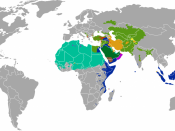Essay QuestionIn day-to-day life, how were women's lives in pre-modern Islamic societies impacted by Islamic law? Under what circumstances and in what ways did women interact with the institutions and processes through which Islamic law was administered? What rights and disabilities did women have in those systems? What problems did women encounter when trying to claim rights given them under the various normative formulations of Islamic law? What strategies and resources were available to women when trying to claim those rights?During pre-modern Islamic societies dating to the present day women's lives were and are greatly impacted by Islamic law. The ancient understanding of women's inferiority to men was still a profound truth of those times and remains to be today. Although Islamic law, from its origin, was extracted directly from the Qur'an and ancient hadiths, and their basis lie primarily within rigid constructed views of women's subordinate roles and placement in society; recent study has encompassed a more liberal sway of the fatwas and qadi of pre-modern times.
As evidenced by numerous mufti throughout our research, case upon case, and issue upon issue, were called to review by the Islamic scholars of ancient and pre-modern times. We will explore some of these cases and issues and will examine the impact of their judgments of how women's rights were administered, the role women had in interacting with the law making institutions, the rights afforded to women through these interactions, and the problems faced when encountering the long entrenched gender based inequities. Through this examination of women's progressive interaction with Islamic law, I will prove that somewhat shifting from ancient traditions and beliefs of the subordination of women, pre-modern law, especially in the 18th and 19th centuries, has evolved toward a more societal and politically correct understanding...


